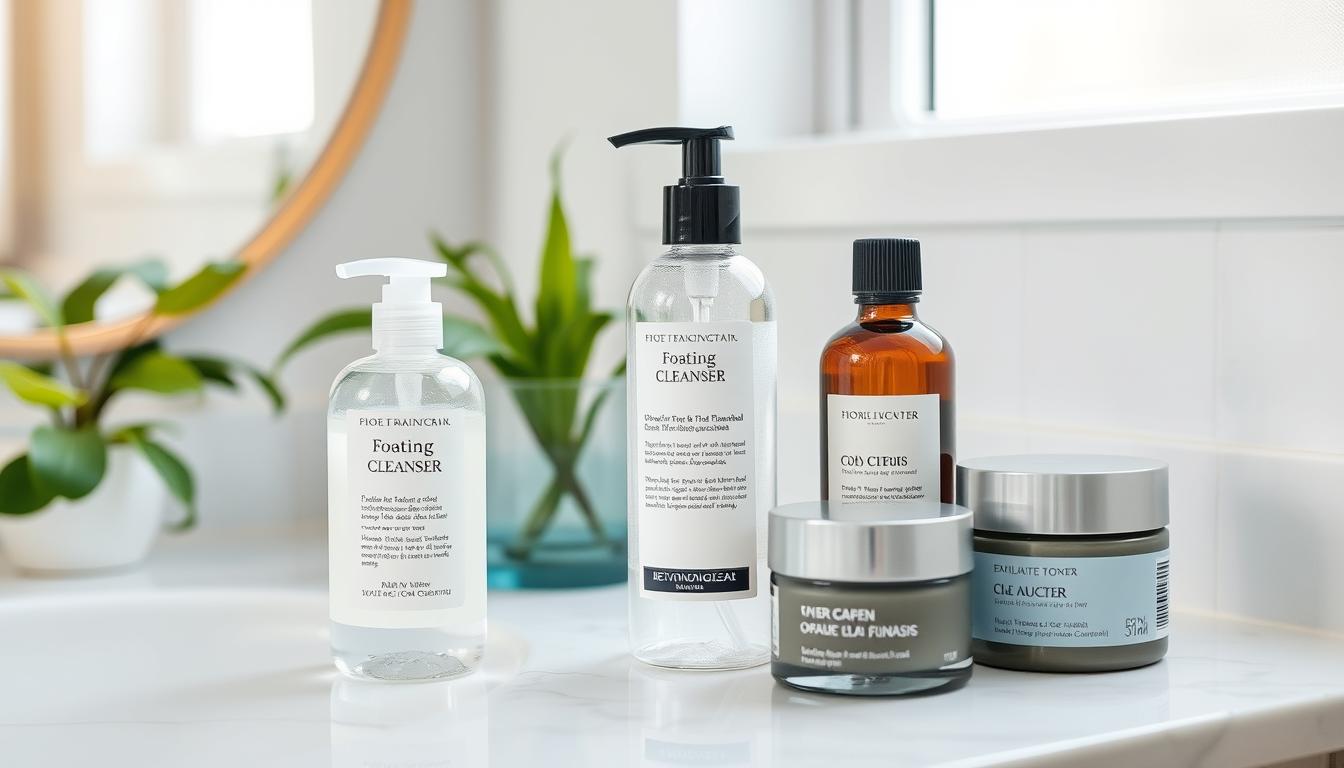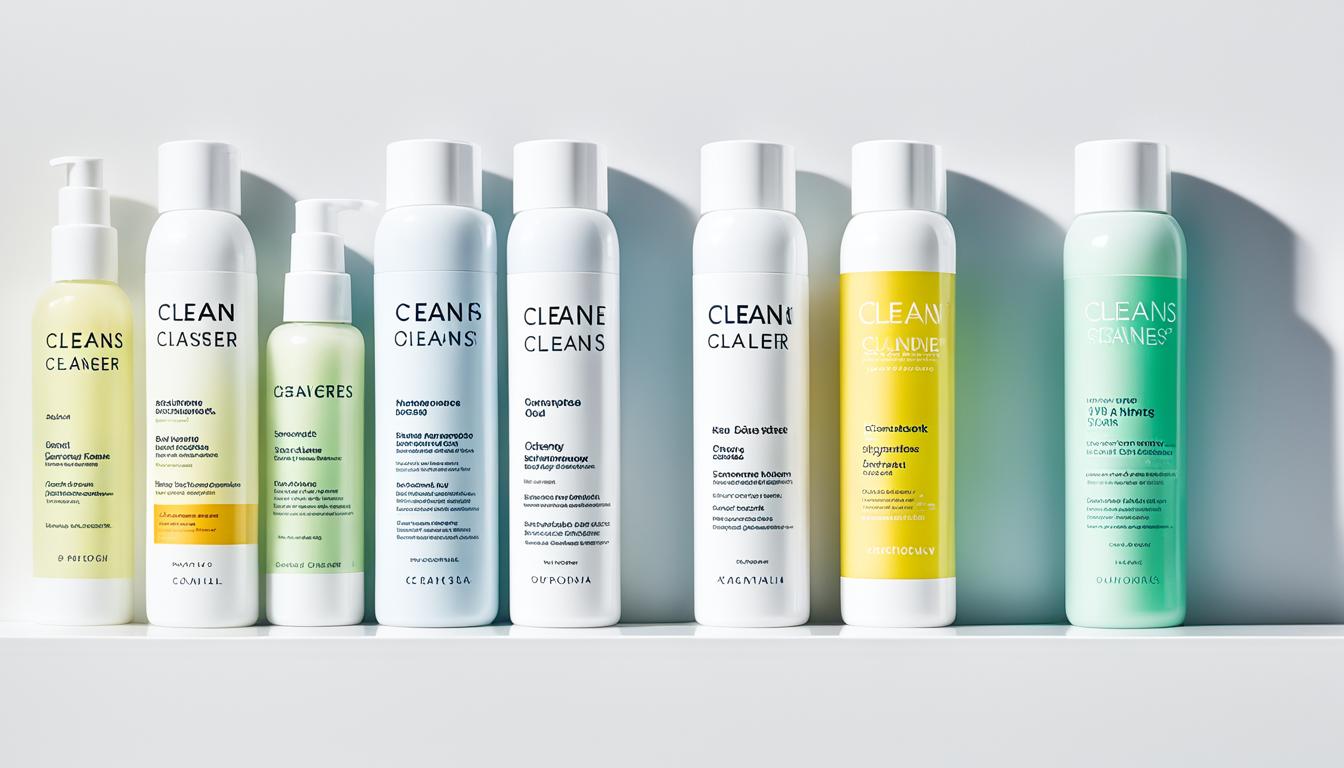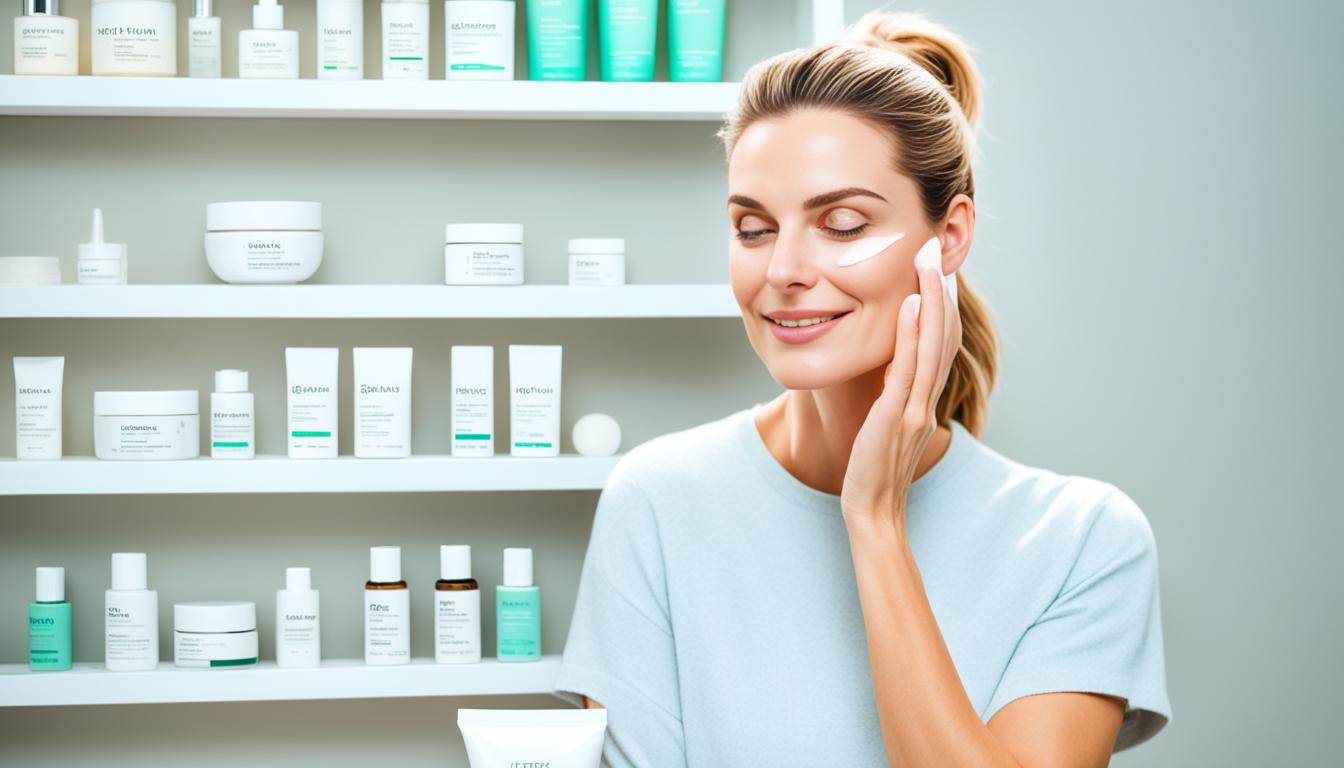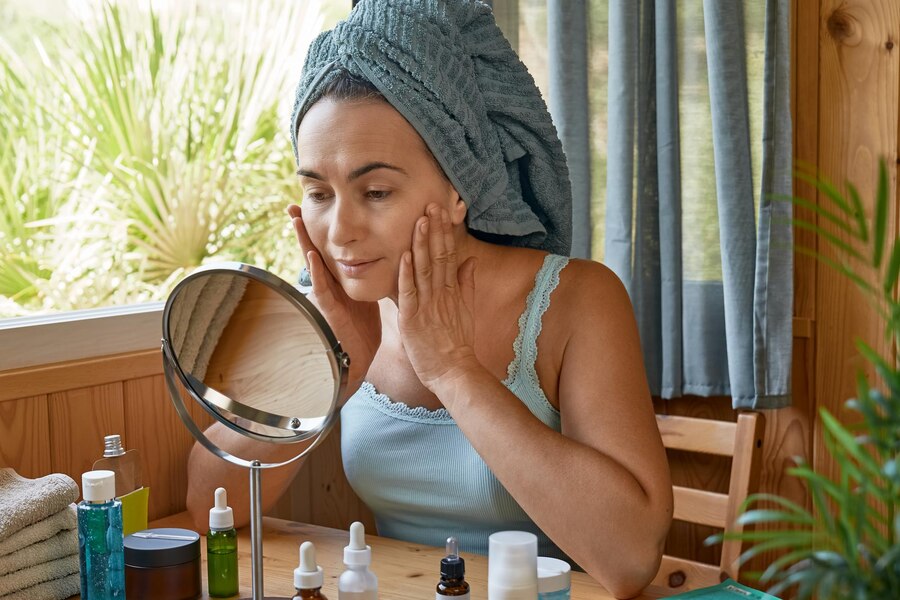Simple Skincare Routine For Dry Skin: Unveiling Radiant Beauty

Skincare Routine For Dry Skin : Dry skin can be a challenge to deal with, but with a simple and consistent skincare routine, you can achieve a radiant and hydrated complexion. By following these non-negotiable steps, you’ll nourish and protect your skin for optimal health and appearance.
Key Takeaways:
- Properly cleansing the skin is crucial for removing impurities and preparing it for other products.
- Using anti-aging products, such as vitamin C serums and retinoids, can help reverse damage and improve the signs of aging.
- Wearing SPF daily protects the skin from harmful UV rays and helps maintain a healthy skin barrier.
- Consulting a dermatologist can provide personalized guidance and ensure your skincare routine is effective for your specific needs.
- Understanding natural skincare and choosing products made with natural ingredients can nourish and protect the skin.
Properly Cleansing Your Skin
Cleansing is a crucial step in any skincare routine, especially for those with dry and sensitive skin. Using a gentle cleanser is essential to remove dirt, oil, and impurities without stripping the skin of its natural moisture. Look for cleansers that are specifically formulated for dry skin, as they are usually free of harsh ingredients that can further irritate and dry out the skin.
Also Read : Master Your Skincare Routine For Oily Skin With Our Guide
When cleansing your skin, it’s important to follow the correct technique. Start by wetting your face with lukewarm water, then apply a small amount of cleanser to your fingertips. Gently massage the cleanser onto your skin in circular motions, paying attention to areas prone to dryness, such as the cheeks and forehead. Rinse thoroughly with water and pat your skin dry with a soft towel.
Also Read : Best Sunscreen For Kids: Safe & Effective Protection For Playtime!
Choosing the Right Cleanser
When selecting a cleanser for dry skin, opt for a formula that is hydrating and nourishing. Look for ingredients like hyaluronic acid and ceramides, which help to retain moisture and strengthen the skin barrier. Avoid cleansers that contain alcohol, fragrance, or other potential irritants.
Also Read : Discover The Secret To Anti Aging Skincare Today!
“Using a gentle cleanser is essential to remove dirt, oil, and impurities without stripping the skin of its natural moisture.”
| Cleanser Type | Key Ingredients | Benefits |
|---|---|---|
| Gel Cleanser | Hyaluronic Acid, Aloe Vera | Hydrates and soothes the skin |
| Cream Cleanser | Ceramides, Glycerin | Nourishes and moisturizes the skin |
| Micellar Water | Rosewater, Witch Hazel | Gently removes impurities without drying out the skin |
Remember to cleanse your skin twice a day, once in the morning and once at night, to keep your skin clean and healthy. Follow up with a moisturizer immediately after cleansing to lock in hydration and protect your skin throughout the day.
Also Read : Master Your Anti Aging Skincare Routine For Youthful Skin
Using Anti-Aging Products
Incorporating anti-aging products into your skincare routine can greatly benefit dry skin and help combat the signs of aging. These products are specifically formulated to target fine lines, wrinkles, and hyperpigmentation, while also providing hydration and improving overall skin texture.
Also Read : Safe & Gentle Skin Care For Kids – Nourish Their Delicate Skin
A key ingredient to look for in anti-aging products for dry skin is hyaluronic acid. This powerful humectant has the ability to attract and retain moisture, keeping the skin plump and hydrated. Hyaluronic acid also helps to smooth out fine lines and create a more youthful appearance.
Serums are a popular type of anti-aging product that are highly concentrated with active ingredients. They are designed to penetrate deep into the skin and deliver potent hydrating and rejuvenating benefits. When choosing a serum for dry skin, look for one that contains hyaluronic acid, as well as other nourishing ingredients like vitamins C and E.
Benefits of Using Anti-Aging Products:
- Reduces the appearance of fine lines and wrinkles
- Improves skin texture and elasticity
- Hydrates and plumps the skin
- Enhances overall skin radiance
- Helps to even out skin tone and reduce hyperpigmentation
Using anti-aging products with hyaluronic acid can help transform dry skin, leaving it looking smoother, more youthful, and revitalized.
| Product | Main Ingredients | Benefits |
|---|---|---|
| Hydrating Serum | Hyaluronic Acid, Vitamin E | Deeply hydrates, reduces fine lines |
| Night Cream | Retinol, Peptides | Stimulates collagen production, improves skin texture |
| Eye Cream | Hyaluronic Acid, Caffeine | Moisturizes delicate eye area, reduces puffiness |
When incorporating anti-aging products into your skincare routine, it is important to start with one product at a time and gradually introduce new ones. This allows your skin to adjust and prevents potential irritation or sensitivity. Additionally, always follow the instructions provided with each product and be consistent in your usage for best results.
Section 4: Wearing SPF Daily
Protecting your skin from harmful UV rays is essential for maintaining its health and radiance. Wearing sunscreen with a high SPF (Sun Protection Factor) is a non-negotiable step in your skincare routine. Sunscreen not only helps prevent sunburn but also protects your skin from long-term damage and premature aging.
By wearing SPF daily, you can lock in moisture and maintain optimal skin hydration. Sunscreen creates a protective barrier on the skin’s surface, preventing moisture loss and helping your skin stay hydrated throughout the day. This is particularly important for individuals with dry skin, as it helps combat the common issue of skin dehydration.
“Sunscreen not only protects your skin from the harmful effects of UV rays but also helps maintain a healthy skin barrier, lock in moisture, and prevent the formation of wrinkles and sagging.”
When selecting a sunscreen, choose a broad-spectrum formula that protects against both UVA and UVB rays. Look for a minimum SPF of 30, which offers sufficient protection for daily use. Apply sunscreen generously to all sun-exposed areas, including your face, neck, arms, and hands. Remember to reapply every two hours, especially if you’re spending extended periods outdoors or engaging in activities that cause sweating or water exposure.

| Benefits of Wearing SPF Daily | How to Incorporate SPF into Your Routine |
|---|---|
|
|
By incorporating sunscreen into your daily skincare routine, you can protect your skin from harmful UV rays, maintain optimal hydration, and prevent signs of premature aging. Remember, prevention is always better than cure when it comes to skincare, so make SPF a priority in your beauty regimen.
Consulting a Dermatologist
If you are unsure about which products to use or how to design a skincare regimen for your specific needs, consulting a dermatologist can be beneficial. A dermatologist is a medical professional specializing in skin health, and they can provide personalized guidance based on your unique skin type and concerns.
When you visit a dermatologist, they will assess your skin type, which can be dry, oily, combination, or sensitive. This evaluation helps them understand your skin’s unique needs and make recommendations accordingly. They have in-depth knowledge of skincare products and can suggest the most suitable ones for your skin type.
Consulting a dermatologist is particularly important if you have specific skin concerns such as acne, rosacea, or eczema. They can diagnose and treat these conditions, offering expert advice and prescribing appropriate medications or treatments.
A dermatologist can also help you establish a skincare routine that addresses your individual needs and concerns. They can guide you on the proper order of application for different products, recommend specific ingredients to look for, and advise against any potential irritants.
Recommended Products
Here are some recommended products that dermatologists often suggest for various skin types:
| Skin Type | Recommended Products |
|---|---|
| Dry Skin | Hydrating cleansers, moisturizers with hyaluronic acid, gentle exfoliants. |
| Oily Skin | Oil-free cleansers, salicylic acid or benzoyl peroxide-based products, oil-absorbing moisturizers. |
| Combination Skin | Gentle cleansers, oil-free moisturizers, targeted treatments for specific concerns. |
| Sensitive Skin | Fragrance-free and hypoallergenic products, gentle cleansers, moisturizers with soothing ingredients like aloe vera or oat extract. |
Remember, everyone’s skin is unique, and what works for others may not work for you. It’s essential to consult a dermatologist to get personalized advice tailored to your skin’s specific needs.
Understanding Natural Skincare
Natural skincare has gained immense popularity in recent years, as people seek safer and gentler alternatives for nourishing and protecting their skin. Unlike conventional skincare products that may contain chemicals and synthetic ingredients, natural skincare focuses on harnessing the power of plant-based extracts and oils to promote healthy and radiant skin.
By embracing natural skincare, you can provide your skin with the nourishment it needs without exposing it to potentially harmful substances. Natural skincare products are formulated using ingredients sourced from nature, such as botanical extracts, essential oils, and herbal infusions. These ingredients are rich in antioxidants, vitamins, and minerals that can help improve skin tone, reduce blemishes, and enhance overall complexion.
When choosing natural skincare products, it is important to look for those that are free from artificial fragrances, colorants, and preservatives. Opt for products that use non-toxic and sustainable ingredients, ensuring that they are suitable for all skin types. These products are not only effective but also gentle on the skin, making them an ideal choice for those with sensitive skin or allergies.

Benefits of Natural Skincare:
- Safe and gentle on all skin types
- Nourishes and hydrates the skin
- Promotes a healthy and radiant complexion
- Reduces the risk of skin irritation and allergies
- Free from harmful chemicals and toxins
- Environmentally-friendly and sustainable
“Natural skincare focuses on harnessing the power of nature to nourish and protect the skin, providing safe and effective solutions for your skincare needs.”
Investing in natural skincare products can be a great way to prioritize the health and well-being of your skin. By incorporating these products into your routine, you can nourish and protect your skin while embracing a more sustainable and eco-friendly approach to skincare.
Table: Comparing Natural Skincare vs. Conventional Skincare
| Aspect | Natural Skincare | Conventional Skincare |
|---|---|---|
| Ingredients | Derived from natural sources | Chemical-based |
| Effectiveness | Effective and gentle | May contain harsh ingredients |
| Safety | Non-toxic and free from harmful chemicals | Potential risk of allergies and irritation |
| Eco-Friendly | Sustainable and environmentally-friendly | May contribute to pollution and waste |
Determining Your Skin Type
Understanding your skin type is crucial in selecting the right skincare products. Each skin type has its own specific needs and requires tailored care to address its concerns effectively. By determining your skin type, you can provide the proper hydration, nourishment, and protection that your skin needs.
The Importance of a Healthy Skin Barrier
Your skin barrier plays a vital role in maintaining moisture and protecting your skin from external aggressors. For individuals with dry skin, the skin barrier is often compromised, leading to increased transepidermal water loss (TEWL) and sensitivity. It is essential to focus on hydrating and strengthening the skin barrier to improve its function and alleviate dryness.
Hydrating Your Dry Skin
Dry skin lacks natural oils, making it prone to dehydration and flakiness. To hydrate your skin effectively, look for moisturizing ingredients such as hyaluronic acid, glycerin, and ceramides. These ingredients help attract and retain moisture, replenishing the skin’s hydration levels. Additionally, consider using a hydrating facial mist throughout the day to provide a refreshing boost of moisture.
Addressing Your Skin’s Needs
Understanding your skin’s needs goes beyond simply identifying your skin type. Dry skin may also have specific concerns such as fine lines, dullness, or uneven texture. Incorporate moisturizing serums, facial oils, and hydrating masks into your skincare routine to target these concerns and provide additional nourishment for your skin.
| Step | Skin Type | Product Recommendations |
|---|---|---|
| Cleansing | Dry skin | Gentle cream cleansers, hydrating cleansing balms |
| Toning | Dry skin | Alcohol-free toners, hydrating tonics |
| Moisturizing | Dry skin | Rich, emollient creams, moisturizing lotions |
| Treating | Dry skin | Hydrating serums, facial oils, nourishing masks |
By understanding your skin type and addressing its unique needs, you can create a skincare routine that effectively hydrates and nourishes your dry skin. Remember to choose products with moisturizing ingredients, hydrate your skin throughout the day, and consider incorporating targeted treatments for specific concerns. With the right approach, you can achieve a healthy and radiant complexion.

Building a Natural Skincare Routine
Creating a natural skincare routine is a great way to nourish and protect your skin while avoiding harsh chemicals. By following these essential steps, you can establish a simple yet effective regimen that will help maintain a healthy and radiant complexion.
Cleansing
Begin your skincare routine by thoroughly cleansing your skin to remove impurities and prepare it for other products. Choose a gentle cleanser specifically formulated for your skin type, whether it’s dry, oily, or sensitive. Massage the cleanser onto your face using circular motions, then rinse with lukewarm water. Cleansing not only removes dirt and excess oil but also helps to unclog pores, preventing breakouts and promoting a more balanced complexion.
Toning
After cleansing, it’s crucial to balance the pH of your skin and tighten your pores with a toner. Look for a natural toner that contains ingredients like witch hazel or rosewater, which help soothe and hydrate the skin. Apply the toner to a cotton pad and gently swipe it over your face, focusing on areas that are prone to oiliness or congestion. Toning helps to remove any remaining impurities, leaving your skin refreshed and ready for the next step.
Moisturizing
Moisturizing is essential for maintaining hydrated and healthy skin. For dry skin, choose a rich and nourishing moisturizer with natural oils like avocado or jojoba. Apply the moisturizer to your face and neck, gently massaging it into your skin using upward motions. This will help stimulate blood circulation and enhance absorption. Moisturizing locks in moisture, restores the skin’s natural barrier, and prevents dryness and flakiness.
Treating Skin Concerns
If you have specific skin concerns, such as acne, hyperpigmentation, or fine lines, consider incorporating targeted treatments into your skincare routine. Natural ingredients like vitamin C, retinol, or tea tree oil can help address these concerns effectively. Use these treatments after moisturizing, applying them to the areas that require specific attention. Follow the instructions on the product packaging and allow the treatments to absorb fully before applying any additional products.
By following this natural skincare routine, you can nurture your skin with the goodness of natural ingredients while effectively addressing your individual needs. Remember to choose products that are free from harsh chemicals, artificial fragrances, and unnecessary fillers to ensure your skin receives the best care possible.

Enhancing Your Beauty Routine
Incorporating natural products into your beauty routine can elevate your skincare game and promote a healthy, radiant complexion. Whether you’re looking to hydrate, nourish, or address specific skin concerns, there are various natural options available. By incorporating moisturizers, serums, and facial masks into your routine, you can pamper your skin and enhance its natural beauty.

Moisturizers
A good moisturizer is the foundation of any beauty routine. Look for natural moisturizers that contain ingredients like hyaluronic acid, aloe vera, or shea butter. These ingredients provide intense hydration and help lock in moisture, leaving your skin soft and supple. Apply your moisturizer twice a day, in the morning and evening, after cleansing and toning your skin.
Serums
Serums are highly concentrated formulas that deliver targeted benefits to the skin. Look for serums that contain natural ingredients such as vitamin C or niacinamide. Vitamin C serums can brighten your complexion, even out skin tone, and protect against environmental damage. Niacinamide serums can help reduce inflammation, minimize pores, and regulate oil production. Apply a few drops of serum after moisturizing, focusing on areas of concern.
Facial Masks
Facial masks are a great way to give your skin an extra boost of nourishment and relaxation. Look for natural masks that contain ingredients like clay, honey, or botanical extracts. Clay masks can help draw out impurities and detoxify the skin. Honey masks provide deep hydration and soothe dry or irritated skin. Apply a facial mask once or twice a week after cleansing, leave it on for the recommended time, and rinse off for refreshed and rejuvenated skin.
Also Read : 100+ Common Skincare Myths Debunked: Get The Facts!
Conclusion
To achieve a radiant and healthy complexion, it is essential to establish a simple and consistent skincare routine for dry skin. By following these dry skin care tips, you can nourish and protect your skin effectively.
Start by properly cleansing your skin, using a gentle cleanser twice a day to remove dirt and impurities. This step helps keep your pores unclogged and minimizes acne and enlarged pores. Additionally, exfoliating cleansers can reveal smoother and glowing skin when used in the morning.
Another important aspect of a nourishing skincare routine is using anti-aging products. Incorporate a vitamin C serum in the morning to neutralize free radicals and protect your skin from oxidative damage. At night, consider using retinoids or retinols to stimulate collagen production and reduce the signs of aging, such as fine lines, wrinkles, and hyperpigmentation.
Lastly, remember to wear SPF daily to protect your skin from harmful UV rays. Choose a broad-spectrum sunscreen with an SPF of 30 or higher and reapply every two hours when exposed to prolonged sun exposure. Sunscreen not only helps prevent skin damage but also helps maintain a healthy skin barrier, lock in moisture, and prevent wrinkles and sagging.
By following these dry skin care tips and incorporating them into a nourishing skincare routine, you can improve the health and appearance of your dry skin, resulting in a radiant and beautiful complexion.
FAQs
Q: What are the best products for dry skin?
A: The best products for dry skin include those that contain hyaluronic acid, ceramides, glycerin, and essential fatty acids to help hydrate and nourish the skin.
Q: What is a good skincare routine for dry skin?
A: A good skincare routine for dry skin typically involves using a gentle cleanser, a hydrating serum with hyaluronic acid, a rich moisturizer, and a sunscreen for daytime. Additionally, incorporating a nourishing night cream can be beneficial for nighttime skincare.
Q: How can I boost skin hydration in the morning?
A: To boost skin hydration in the morning, use a hyaluronic acid serum followed by a moisturizer to lock in the hydration. It’s also important to drink plenty of water and protect the skin with a sunscreen to maintain hydration throughout the day.
Q: What are some recommended products for dry skin?
A: Some recommended products for dry skin include CeraVe Hydrating Cleanser, CeraVe Hydrating healthy-looking skin Hyaluronic face wash Acid Serum, and CeraVe Eye Repair Cream, as they are formulated to provide intense hydration and care evening routine cerave according to dermatologists outer skin layer hydrating hyaluronic acid serum routine for dry skin nourishment morning help lock in moisture face and body skincare for dry, dehydrated skin.
Q: How should I choose the best skincare routine for dry skin?
A: When choosing the best skincare routine for dry skin, it’s important to look for products that are gentle, hydrating, and free from harsh ingredients that can further dehydrate the skin. Consulting with a board-certified dermatologist can also help in selecting the most suitable products and routine for your specific skin needs.
Q: What is the importance of a nighttime skincare routine for dry skin?
A: A nighttime skincare routine for dry skin is crucial as it allows the skin to repair and replenish while you sleep. Using a nourishing night cream or moisturizer helps to restore moisture and strengthen the skin’s protective barrier, promoting healthy-looking and radiant skin.
Q: How can I address dark circles and puffiness associated with dry skin?
A: To address dark circles and puffiness associated with dry skin, consider using an eye cream specifically formulated to hydrate and brighten the under-eye area. Look for products containing ingredients like hyaluronic acid and niacinamide to help improve the appearance of dark circles and puffiness.
Q: What should I avoid in my skincare routine for dry skin?
A: In a skincare routine for dry skin, it’s important to avoid products that contain alcohol, fragrances, and harsh detergents, as these can strip moisture from the skin and exacerbate dryness. Opt for gentle, hydrating products that support the skin’s natural moisture barrier.
Q: Is it recommended to apply skincare products when the skin is still damp?
A: Yes, it is recommended to apply skincare products when the skin is still damp, especially for individuals with dry or dehydrated skin. This can help seal in the moisture and enhance the absorption of hydrating ingredients, maximizing the benefits of the products.
Q: What is the ideal approach for protecting dry skin throughout the day?
A: To protect dry skin throughout the day, it’s essential to use a sunscreen with at least SPF 30 to shield the skin from harmful UV rays. Additionally, incorporating a hydrating mist or facial spray can help to refresh and rehydrate the skin, especially in dry or arid environments.





